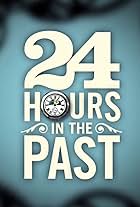The Enemies of Reason
- Téléfilm
- 2007
- 1h 30m
ÉVALUATION IMDb
8,2/10
1,9 k
MA NOTE
Ajouter une intrigue dans votre langueScientist Richard Dawkins turns a hostile eye on the world of alternative medicine.Scientist Richard Dawkins turns a hostile eye on the world of alternative medicine.Scientist Richard Dawkins turns a hostile eye on the world of alternative medicine.
Photos
Chris French
- Self
- (as Dr. Chris French)
Craig Hamilton-Parker
- Self
- (as Craig Hamilton Parker)
Histoire
Le saviez-vous
- GaffesIn part one of the series, when Richard Dawkins reads the horoscopes from the magazine, if you look in the window behind him you can see a printed page taped into the magazine.
- ConnexionsFeatured in Screenwipe: Episode #4.1 (2007)
Commentaire en vedette
I agree 100% with the positions that Richard Dawkins defends in this film. It is focused on the UK where there has been a broad acceptance of homeopathy even up to Prince Charles. In the USA we need a Dawkins to take up the task of identifying our irrational, fraudulent products and movements. This film should make the viewer wonder: why are these nonsensical snake oil ideas finding an audience today?
I think Westerners are increasingly open to appeals that are fake and easily disprovable because of shifts in our culture. The rise of academic fields that oppose Enlightenment principles: feminist study, black study, anti-colonial study, and postmodern criticism provide intellectual cover for arguments from personal experience. Our free market tolerates commercial appeals regardless of their rationality or lack thereof. Our popular mistrust of all institutions has disarmed the natural predators of irrational bunk: the academy, government, journalists. Thus the New Age people can promote their ideas without getting the public intellectual thrashing they deserve.
Also, we have misapplied helpful ideas about the right of minorities to exist and the importance of understanding all sides of an issue. There is a reluctance to simply state that when a proposition about the world has been investigated vigorously and no strong support had been found, we are obliged to adopt the simplest conclusion that there is very likely nothing there and we should put our effort elsewhere. Instead we demand absolute proof of nonexistence of an effect, not realizing that this is impossible. And so we carry on insisting that ideas like cell phone cancer, vaccine autism and even creationism are still viable.
Be sure to check YouTube for uncut versions of all the interviews in this film. They are fascinating and they will expand the viewer's sense of who the interview subjects are, how sincere and open they are, and whether they understand their own ideas well.
Deepak Chopra comes across in his full interview as well informed and equally open to Western and Eastern medical traditions. In the film, his edited interview is more one-sided: confrontational and less thoughtful.
The Nicholas Humphrey interview gets into Darwinian medicine, a fascinating topic that gives us a very different perspective on paranormal ideas. He talks about placebos in detail and about how belief in a nonexistent soul may well be part of our healthy evolved psychology.
I think Westerners are increasingly open to appeals that are fake and easily disprovable because of shifts in our culture. The rise of academic fields that oppose Enlightenment principles: feminist study, black study, anti-colonial study, and postmodern criticism provide intellectual cover for arguments from personal experience. Our free market tolerates commercial appeals regardless of their rationality or lack thereof. Our popular mistrust of all institutions has disarmed the natural predators of irrational bunk: the academy, government, journalists. Thus the New Age people can promote their ideas without getting the public intellectual thrashing they deserve.
Also, we have misapplied helpful ideas about the right of minorities to exist and the importance of understanding all sides of an issue. There is a reluctance to simply state that when a proposition about the world has been investigated vigorously and no strong support had been found, we are obliged to adopt the simplest conclusion that there is very likely nothing there and we should put our effort elsewhere. Instead we demand absolute proof of nonexistence of an effect, not realizing that this is impossible. And so we carry on insisting that ideas like cell phone cancer, vaccine autism and even creationism are still viable.
Be sure to check YouTube for uncut versions of all the interviews in this film. They are fascinating and they will expand the viewer's sense of who the interview subjects are, how sincere and open they are, and whether they understand their own ideas well.
Deepak Chopra comes across in his full interview as well informed and equally open to Western and Eastern medical traditions. In the film, his edited interview is more one-sided: confrontational and less thoughtful.
The Nicholas Humphrey interview gets into Darwinian medicine, a fascinating topic that gives us a very different perspective on paranormal ideas. He talks about placebos in detail and about how belief in a nonexistent soul may well be part of our healthy evolved psychology.
Utile•52
- wikipediacabal
- 29 sept. 2013
- Lien permanent
Meilleurs choix
Connectez-vous pour évaluer et surveiller les recommandations personnalisées
Détails
Box-office
- Budget
- 140 000 £ (estimation)
- Durée1 heure 30 minutes
- Couleur
Contribuer à cette page
Suggérer une modification ou ajouter du contenu manquant




















